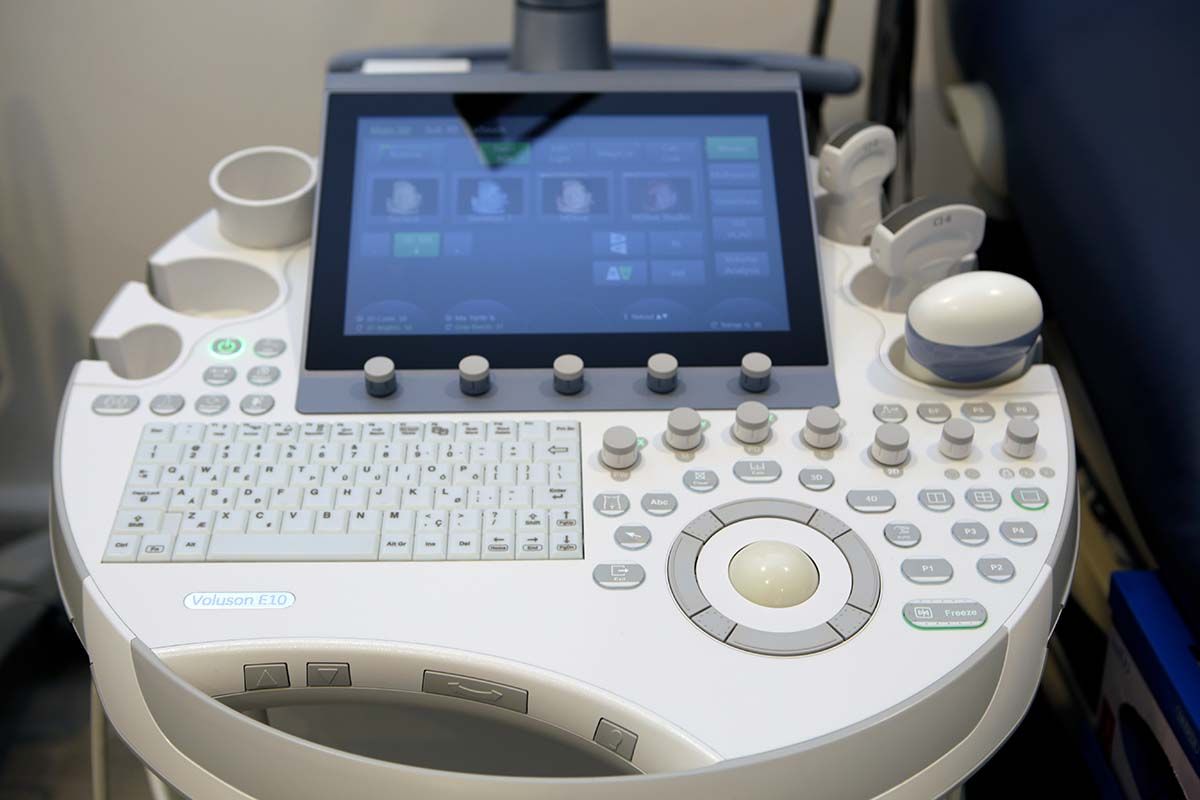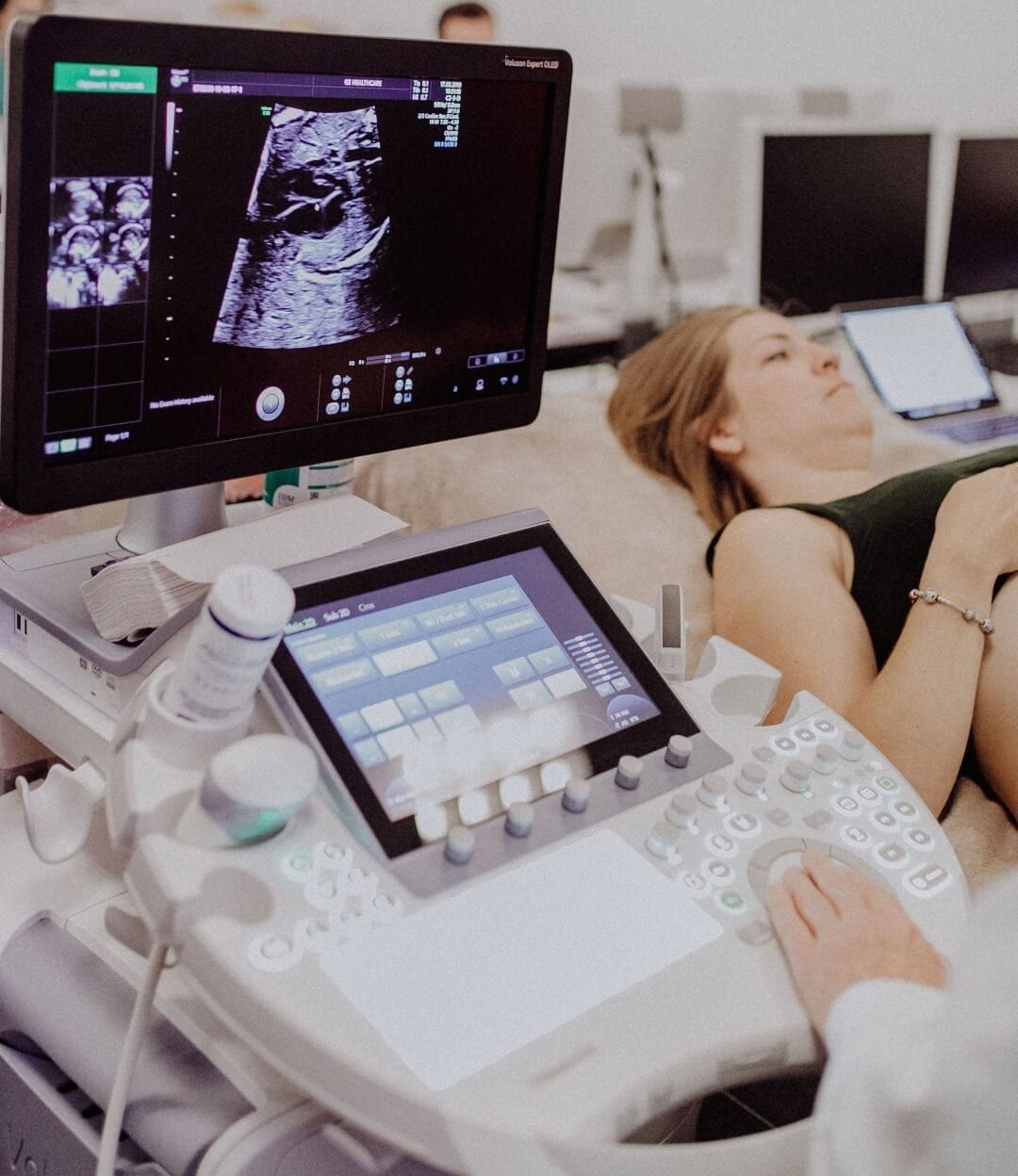Expert Endometrial Lining in London
Endometrial Lining scan, commonly referred to as ‘Baseline Ultrasound’ is commonly required by fertility clinics to plan the treatment. Our scans are performed by specialist sonographers for accurate and reliable results.

Leading Experts in Fertility Scans
Endometrial Lining Scan, also known as the ‘Baseline Scan’, is designed to assess the thickness of the womb as well as assessment of its general outline and structure.
These scans are popular among patients going through IVF treatment abroad and are designed to guide your referring clinician to understand and design your treatment accordingly by estimating the best time/chances for conception as well as preparation prior to embryo transfer in your IVF journey.
That’s why it is imperative to get reliable readings in these scans to maximise the outcome of your treatment.

Our advanced ultrasound equipment allows superior image and screening
Choose London Pregnancy Clinic for your Endometrial Lining Scan
-
We use the latest ultrasound equipment from GE – Voluson E10 at its BT20 configuration
-
Our fertility ultrasound scan will determine the presence or absence of any pathology such as Fibroids/Polyps and include a 3D assessment where appropriate
-
Scan with a specialist sonographer with a wealth of experience in fertility scans
-
Detailed ultrasound report and images promptly sent to you and to your referring consultant or clinic
-
Comprehensive packages and bundled prices designed to support your fertility journey
-
Same day, evening and weekend appointments
-
5* rated service on Doctify, TrustPilot and Google
More about our Endometrial Lining Scan
An endometrial lining scan is a medical imaging test that examines the thickness and texture of the lining of the uterus, known as the endometrium.
The endometrial lining scan is typically done to evaluate the endometrium for abnormal growths, such as polyps or fibroids, or to monitor the thickness of the endometrium in women who are undergoing fertility treatments. The thickness and texture of the endometrium can provide important information about a woman’s hormonal status and fertility.
In general, a normal endometrial lining is between 8 and 11 millimeters thick, and has a smooth texture. However, the thickness of the endometrium can vary depending on a woman’s age, menstrual cycle, and hormonal status. It’s important to discuss any concerns or questions about the endometrial lining scan with your healthcare provider.
Our scans are performed by our specialist sonographer who will provide detailed ultrasound scan report as well as the images from your scan. These will be sent to you securely via our cloud sharing system Tricefy.
We can also arrange your results to be sent to your referring clinic for them to discuss and interpret the results for the continuation of your treatment.
The patient must discuss the results of the ultrasound and blood tests with their referring clinician/IVF consultant.
Our sonographers will not be able to interpret the results of the scan for you, and it is important for a qualified professional in fertility and reproductive medicine to explain the results to you.
If you require a consultation, please note that our consultant gynaecologist – Mr Prashant Purohit is available for a consultation for an additional fee. You can learn more about those services by following the link below.
On most occasions, your referring clinic will ask you to have more than one scan to make sure they obtain all the necessary information about your endometrium to maximise the success of your fertility treatment.
At London Pregnancy Clinic we understand that your IVF treatment can be stressful and costly. We have built valuable working relationships with fertility clinics across Europe and the Middle East and work closely with them to make sure they have all that is required for your treatment. We also designed bundled prices for returning patients to make multiple scans more cost effective.
Your fertility clinic could also require other types of scan alongside your Follicle Tracking Scan:
- Folicle Tracking Scan: A follicle tracking scan is an ultrasound examination that monitors the growth and development of ovarian follicles to optimise the timing of conception or in-vitro fertilisation (IVF) (£150)
- HyCoSy Scan: A HyCoSy scan is a non-invasive ultrasound procedure used to assess the patency of the fallopian tubes and detect abnormalities in the uterus and ovaries (£550)
- Pelvic Scan: A pelvic scan is an ultrasound examination that provides images of the structures and organs in the lower abdomen/pelvic area, including the uterus, ovaries and bladder (£260)

Baseline Fertility Scan at London Pregnancy Clinic
We kindly advise our patients to arrive 10 minutes early for their appointments. Upon arrival, you will be greeted by our friendly admin team at the front desk. You will be asked to fill out a registration form if you have not done so already. We recommend this be completed before your appointment. You will be asked to use our facilities and have an empty bladder for your transvaginal ultrasound scan. During your appointment, you will be provided with a skirt cover to change into. There will be a private and separate area for you to get changed. If you have specific requirements, please ask, and our team will do their best to accommodate.
Shortly after the ultrasound scan is performed, you will receive an email containing your detailed ultrasound report including the images for your referring consultant to review and advise. We can send a copy of your ultrasound report to your referring consultant upon request so that they can receive your results as early as possible. It is possible to share video-clips of your ultrasound scan with you and your consultant if requested in advance.
Transvaginal Ultrasound, also known as internal or endovaginal ultrasound scan, is a safe technique which is routinely performed in Gynaecology to assess the female reproductive organs. This technique is also beneficial in early pregnancy ultrasound examination. There is no risk or harm caused by performing transvaginal ultrasound scan. This is a crucial scan as it provides your clinician with a detailed view of the reproductive organs ensuring the best possible outcome.
The scan is performed using a transvaginal transducer cleaned by using safe and approved medical disinfectant. The transducer is covered with a non-latex probe cover and sterilised gel. The transducer will be inserted into the vagina by your performing operator. There is a need to move the transducer side to side and up and down to obtain satisfactory images.
The procedure is safe and not painful. Please let the clinician know if you are experiencing any discomfort.
Yes, ultrasound is considered safe for medical examinations. Ultrasound uses high-frequency sound waves to produce images of the inside of the body, and it does not use ionising radiation, making it a safe and non-invasive option for many diagnostic tests.
Ultrasound has been widely used in medical practice for several decades and has a well-established safety record. There is no evidence that ultrasound causes any long-term harm to the body.
We will be able to accommodate a large variety of blood test which your referring clinic may as for. For example, a common blood test required in preparation for a fertility treatment is the AMH test, to test the level of anti-müllerian hormone in your blood.
AMH, and many other tests can be done during the same appointment for an additional fee. Visit the link below to find out more about our blood tests.
The timing of an endometrial lining scan may vary depending on the reason for the scan.
If the scan is being done to monitor the thickness and texture of the endometrium in women undergoing fertility treatments, the timing of the scan is typically coordinated with the woman’s menstrual cycle. The scan is usually done between days 10 and 14 of the cycle, when the endometrium is expected to be at its thickest.
If the scan is being done to evaluate the endometrium for abnormal growths or other issues, the timing may depend on the woman’s symptoms and medical history. In general, the scan can be done at any time during the menstrual cycle, although it may be more informative when done closer to the start of the menstrual cycle when the endometrium is thinner.
Your healthcare provider can help determine the best timing for an endometrial lining scan based on your individual circumstances and medical history.
Yes, ultrasound is generally considered safe for medical examinations. Ultrasound uses high-frequency sound waves to produce images of the inside of the body, and it does not use ionizing radiation, making it a safe and non-invasive option for many diagnostic tests.
Ultrasound has been widely used in medical practice for several decades and has a well-established safety record. There is no evidence that ultrasound causes any long-term harm to the body.
An endometrial lining scan is a non-invasive procedure and is generally not painful. During the procedure, a sonographer will insert a small transvaginal ultrasound probe into the vagina to produce images of the ovaries. You may feel some mild discomfort or pressure during this part of the exam, but it should not be painful.
In some cases, you may experience mild cramping or discomfort during the exam, particularly if you have a full bladder. This can happen because a full bladder can push on the uterus, causing discomfort. However, this is usually temporary and subsides once the exam is complete.
If you experience pain during the procedure, it’s important to let the sonographer know right away so they can adjust the procedure or take other steps to minimize your discomfort. In rare cases, women with certain medical conditions or sensitivities may experience more discomfort during the exam, but this is not the norm.
At London Pregnancy Clinic, we are specialists in fertility and reproductive medicine. For a more round picture of your fertility profile, our gynaecologists could recommend other examinations such as AMH test, or our full fertility health assessment package.
Polyps in the vagina are growths that arise from the lining of the vagina or the cervix. These growths are usually noncancerous (benign) and can vary in size and shape. Vaginal polyps can occur at any age, but are most commonly found in women who have gone through menopause.
The exact cause of vaginal polyps is unknown, but they may be related to hormonal changes, inflammation, or irritation. Some women with vaginal polyps may not experience any symptoms, while others may have abnormal vaginal bleeding, discharge, or pain during sexual intercourse.
If vaginal polyps are suspected, a gynecologist may perform a pelvic exam and may use a speculum to visualize the growths. A biopsy may also be done to confirm the diagnosis and to rule out the possibility of cancer.
Treatment for vaginal polyps typically involves surgical removal of the growths. This can be done in a gynecologist’s office using local anesthesia or in an operating room under general anesthesia. The removal of vaginal polyps is usually a minor procedure and most women can return to their normal activities within a few days.
Fibroids, also known as uterine fibroids or leiomyomas, are noncancerous growths that develop in the wall of the uterus. They are the most common type of benign tumor in women of reproductive age.
Fibroids can range in size from small, pea-sized growths to large, grapefruit-sized masses. They can occur in different parts of the uterus and may be single or multiple.
The exact cause of fibroids is not known, but they are thought to be influenced by hormones such as estrogen and progesterone. Risk factors for developing fibroids include age, family history, and obesity.
Most women with fibroids do not experience any symptoms, but for some, fibroids can cause heavy menstrual bleeding, prolonged menstrual periods, pelvic pressure or pain, frequent urination, and constipation.
The diagnosis of fibroids can be made by a pelvic exam, imaging studies such as ultrasound or MRI, or a biopsy. Treatment for fibroids depends on the size and location of the growths, as well as the severity of symptoms. Treatment options may include medication, surgery, or less invasive procedures such as uterine fibroid embolization (UFE) or MRI-guided focused ultrasound (MRgFUS). The choice of treatment will be based on individual circumstances, including the woman’s age, desire for future pregnancy, and overall health.
DO YOU WANT TO KNOW MORE ABOUT OUR FOLLICLCE TRACKING SCAN?


